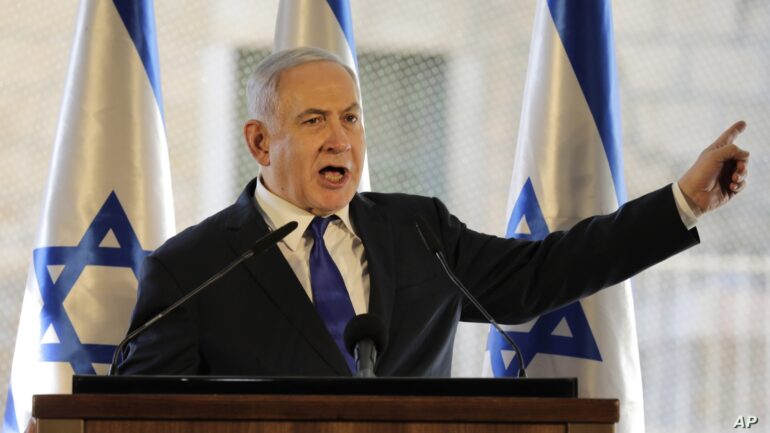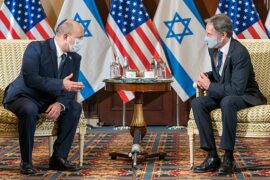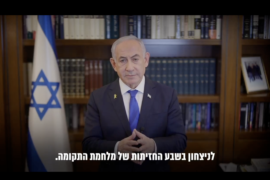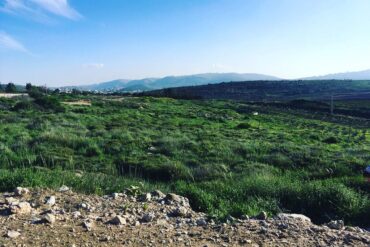Prime Minister Binyamin Netanyahu (Likud) took part in the state ceremony in the Judean city of Hebron on Wednesday, marking 90 years since the infamous 1929 massacre of the city’s Jewish population.
Although incited by Palestine’s British Mandate authorities, the Arab riots that claimed 67 Jewish lives solidified a broader attitude of distrust an antagonism against the country’s Arab population.
Following the massacre, the British authorities forcibly expelled the city’s remaining Jewish population. Jews did not return to the city until 1968, one year after Israel liberated the city from Jordan in the Six-Day War.
Netanyahu said at Wednesday’s event that “We came to express victory. We returned to our source and that is our victory. Bloodthirsty rioters carried out the horrific massacre 90 years ago. They were sure they were uprooting us from this place once and for all – they were wrong.”
The prime minister also acknowledged that some Hebronite Arabs had defended their Jewish neighbors during the riots, noting that “The few in the Arab population who tried to protect their Jewish neighbors should be commended. They acted morally while risking their lives.”
Netanyahu addressed the strengthening of in the city’s modern Jewish population, saying that “The Maḥpella House was populated last week and we are addressing other important issues regarding access to the Cave of the Patriarchs and rights to Jewish property. We do not come to dispossess anyone, but no one will dispossess us. We are not foreigners in Hebron, we will remain in it forever.”
Hebronite Orit Struck, a former member of Knesset and current candidate for the Yemina party, criticized Netanyahu for failing to approve Jewish construction in the city.
“Prime Minister Netanyahu, you spoke very nicely about historical justice. But you are not a copywriter. You are the prime minister of the Jewish people. You should do, not just talk,” she said.
She further demanded that Netanyahu approve Jewish housing in the Hebron market complex outside the Avraham Avinu neighborhood, where abandoned market stalls are currently located.
The property had belonged to Hebron’s Jewish community before 1929 but lies abandoned due to an old rental agreement with Palestinian shop owners, which was still considered legally binding. For security reasons, however, the army doesn’t allow Palestinians to access the site. When Jews converted the stalls to makeshift homes for a brief period, they were forcibly expelled by Israeli security forces.
The stalls, located just next to the site where the Romans had sold captured Jewish fighters into slavery following the Bar-Kokhba Revolt in 135, serve as a clear example for how local Jews and Palestinians continue to feel disenfranchised by the policies and structures governing the city sacred to both peoples.
Prior to Netanyahu’s arrival at the event, Yemina party leader Ayelet Shaked called on the prime minister to authorize Jewish construction in the market complex.
As a former Israeli justice minister, Shaked recalled that nine months earlier there had been a breakthrough in the legal opinion regarding the status of the market place that allowed it to be restored to Jewish ownership.
“All that remains to execute this historic decision is the approval of the Israeli prime minister,” she said.
“We expected Netanyahu to announce that decision today.”
While it’s true that Hebron is one of the most important cities to the Jewish people and also true that the only reason the city was devoid of Jews between 1929 and 1968 is because of a terrible injustice perpetrated against the Jewish community, the way in which Jews correct that injustice must be careful to avoid perpetrating new injustices against others.
The Jews in Judea, especially in the city of Hebron, are not a foreign population. We belong in Hebron just as we belong in our entire homeland. The problem is that Israeli policies in the city very much resemble those of occupation forces and create the impression that we don’t belong. Israel’s military occupation of the West Bank tends to undermine the Jewish people’s legitimate right to live and grow in Judea and Samaria.
Jews should be able to live in Hebron. More housing and opportunities for Jews to live in the city should be created. But not at the expense of the city’s Palestinian population, which currently suffers under conditions of occupation even worse than in the rest of the West Bank.
So the question isn’t should the Jews be living in Hebron. It’s how the Jews should be living in Hebron. Can we succeed at living in the city as natives and not as occupiers. Can a Jewish presence thrive in Hebron in such a way that doesn’t negatively impact the city’s other inhabitants?
The very act of taking such questions seriously could revolutionize the thinking of Hebron’s Jews and their supporters, greatly enhancing our abilities to correct past injustices and realize our historic aspirations in our homeland.





